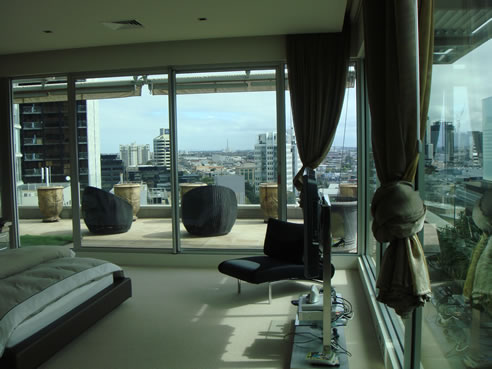Window Film Prevents Electromagnetic Interference by WFAANZ Waving goodbye to EMI All electronic devices emit electromagnetic radiation. It is what wireless computer networks and mobile phone towers use to send data. It is extremely effective, but there are undesirable effects of transmitting information this way. Data transmitted on an internal wireless network can be accessed from outside the building, and mobile phone towers can emit high levels of this invisible radiation. Electromagnetic interference or EMI is the disruption of electromagnetic radiation. Moderate or high-powered wireless transmitters are key causes of EMI. People living near radio or television transmitters or in a large city have reported disruptions to cordless telephones, home entertainment systems, computers and even medical devices. An apartment owner in one of Melbourne's premier boulevards was concerned by possible EMI problems from mobile phone repeaters on top of neighbouring buildings. Impressive floor to ceiling windows and doors inside his apartment left it vulnerable to electromagnetic radiation. "As a precautionary measure, I wanted to shield my apartment from EMI exposure and after researching the issue discovered that certain window films offer this protection. Initially, I had the apartment professionally tested for EMI levels. While the readings were well below the maximums set by Australian Standards, I decided to install window film to the areas with the highest readings, just to be safe," he said. Melbourne-based window film experts at The Tint Shop were chosen to install the window film. The Tint Shop Manager, Damien Fattore, comments, "We installed 36m2 of film to nine master bedroom windows and one lounge window. This install demonstrates why an experienced professional should always apply film. It demanded precision to ensure the film covered the entire glass surface." Silicone seals were removed from each window frame, and the film fitted to the edge of the glass. A glazier reinstalled the silicone seals once the window film had been applied. Maximum coverage of glass was achieved, plus the silicone sealed the film onto the glass to help prevent corroding. Damien continues, "One of the benefits of window film is that is can be retrofit, the job finished quickly and easily with minimal inconvenience to the tenant. It took two installers four hours to complete this job. "The film we installed is almost clear, so it does not impede the view at all, plus it offers 55% heat reduction. In effect, we solved a variety of problems with the one product. The client did not even realise such a product existed and was extremely happy with the end result." A number of different window films are available in Australia to help control EMI by shielding glass from electromagnetic radiation. Rob Hamilton, President of the Window Film Association of Australia and New Zealand (WFAANZ), comments, "These films act as a barrier as a transparent metal layer blocking the wavelengths of electromagnetic radiation. Films with a high metal content give the best shielding values. The metal type also influences shielding properties, with more conductive metals showing better electromagnetic attenuation. Those interested in this sort of window film should choose a WFAANZ distributor member product as they come with a minimum seven-year warranty, and some residential applications are supported by a lifetime warranty." Another application for these films is information security. Rob comments, "The radiation transmitted by electrical equipment like computers and phones can be intercepted and decoded by high-tech criminals. Window films have been used in government and business offices around the world to protect their information and prevent electronic espionage." WFAANZ comprises distributor members and installer members like The Tint Shop. WFAANZ installer members have access to the latest industry developments and abide by a strict code of practice.
About window film
About WFAANZ
|
+61 2 9498 5241
|


 Random glass explosions prompt safety
Random glass explosions prompt safety Top 10 Window Film Hacks | WFAANZ
Top 10 Window Film Hacks | WFAANZ Window Film Advice for Home Owners |
Window Film Advice for Home Owners | Decorative Window Films | WFAANZ
Decorative Window Films | WFAANZ Window Film Assosciation Member TintFX
Window Film Assosciation Member TintFX Window Film Energy Saving Benefits Video
Window Film Energy Saving Benefits Video Star Ratings Make Window Film Selection
Star Ratings Make Window Film Selection Solar Control Window Film Environmental
Solar Control Window Film Environmental Window Film and Commercial Building
Window Film and Commercial Building Window Tinting Solutions from WFAANZ
Window Tinting Solutions from WFAANZ WFAANZ window film - makeovers that make
WFAANZ window film - makeovers that make Accident proofing windows and doors with
Accident proofing windows and doors with Safety film to foil thieves by WFAANZ
Safety film to foil thieves by WFAANZ Nano-ceramic window film -
Nano-ceramic window film - Window Film Association of Australia and
Window Film Association of Australia and WFAANZ window-make over for Newtown
WFAANZ window-make over for Newtown A new web site for the Window Film
A new web site for the Window Film Window film saves Forty Winks stock -
Window film saves Forty Winks stock - Window film and energy - WFAANZ
Window film and energy - WFAANZ Film saves energy at Collins Street -
Film saves energy at Collins Street -
